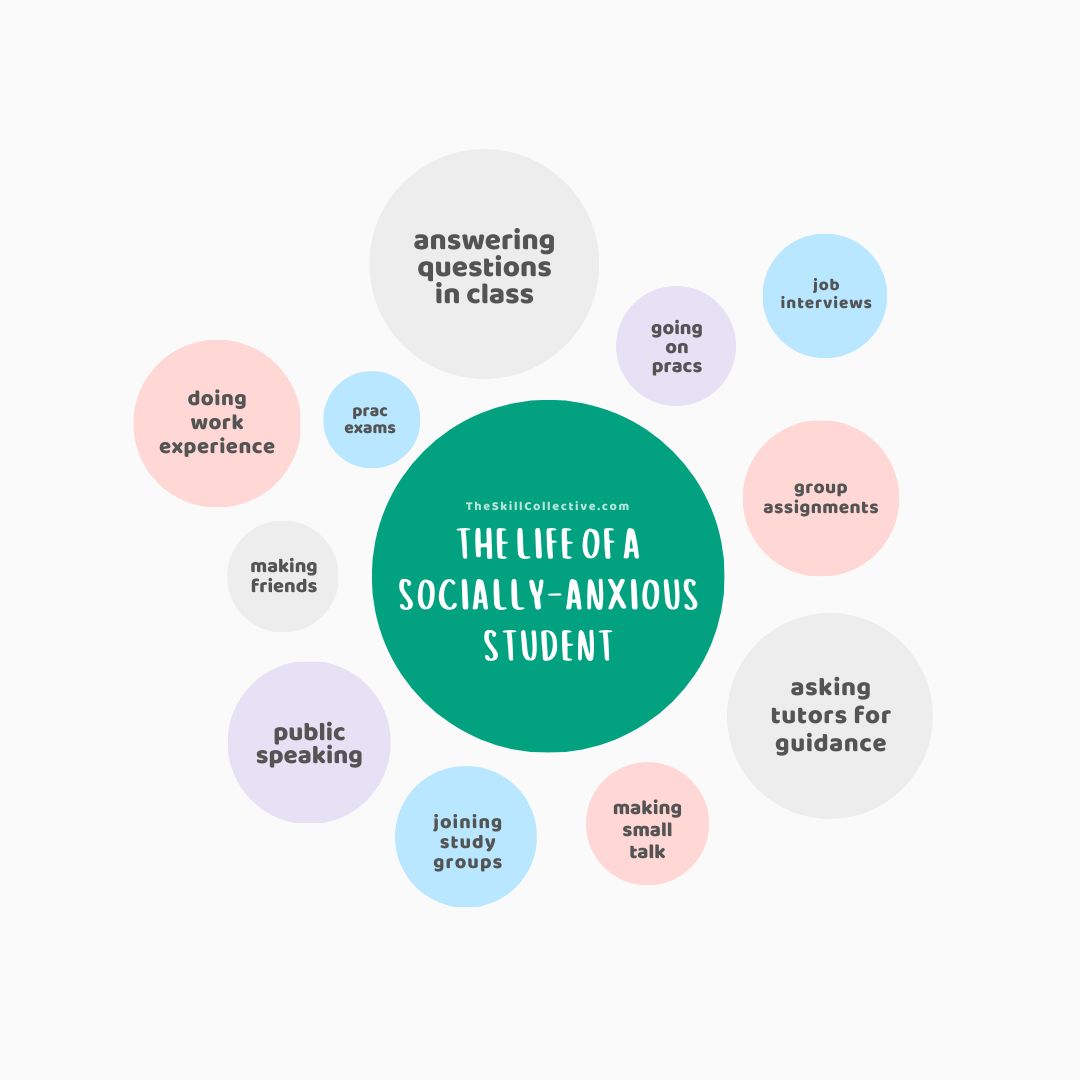STUDENT wellbeing, MENTAL HEALTH, and performance
Being a student might outwardly seem to be a nice life - long holidays, and fewer ‘adulting’ responsibilities look really great on paper. But, scratch the surface and reality looks very different. Students face various pressures, including:
Pressure to perform academically, particularly for fields that require higher entry grades [1].
Juggling work and study demands can be tricky! While 82% of students are in paid work, only 35% of these think they have satisfactory study/work balance. More than one quarter of full-time students regularly miss class because of work and 41% report that work negatively impacts on their study [2].
Poor diet, excessive alcohol consumption, and disrupted sleep patterns all have a negative impact on student mental health [3].
Moving away from home (for rural, interstate, and international students) and away from a support network of family, friends, and cultural and community connections can increase the risk of mental health problems [4, 5]. Add to that the pressure of independent living/adulting!
Planning for a future career (or the pressure to make the ‘right’ decision about the decades ahead).
Maintaining relationships and friendships whilst trying to study and work.
Underlying poor mental health - including anxiety, low self-esteem, unhealthy perfectionism and depression - can all impact on academic and general functioning.
The last of these is of particular interest - what does student mental health look like? Here are some sobering statistics:
A survey of high school students in Australia showed show that one-fifth reported experienced high or very high levels of psychological distress. [6]
A survey of Australian university students showed that one in four university students experience mental health problems every year.[7]
75% of all mental disorders occurs before the age of 24 years old. [8]
Students experiencing mental health problems are more likely to leave their studies prematurely and experience problems entering the workforce [9]. Therefore, it’s important to take a holistic approach when considering what a successful student looks like.
WHAT HELPS STUDENTS IN THEIR STUDIES?
Student success is not just about grades, but also about how well students navigate life more generally. The student years are a time of transition during which students can build their toolkit to set them up for life. Many of our team have worked with students for years, and here’s what we suggest:
Choosing the right study skills
Not only do the right study skills have a big impact on academic performance, they also to help you combat study fatigue! Check out our blog post on How to Choose the Right Study Techniques to help you study smarter, not harder.
having The right mindset as a student
Your mindset can have a powerful impact over performance [10], and this is particularly true for students! Check out our Resource Library for our tip sheet on Mindset (Fixed vs. Growth mindset). Success as a student isn’t due purely to whether you’re smart enough or not - it’s understanding how to study, and how to sustain your energy. These can be learned and improved through practice.
Regulating strong emotions
Challenges and setbacks will happen over the course of your studies - academic issues, friendship ruptures, family difficulties, and so on. Learning how to manage strong emotions will be a helpful skill to have in your toolkit. In particular, managing anxiety is a really important skill for students, with a recent survey finding that around 80% of tertiary students felt their anxiety and/or stress affected their studies [11]. Check out our article for pointers on How to Manage Anxiety on Campus and make a start on feeling better.
managing exam anxiety
Preparing well for exams through helpful study skills is important, but when it comes to exam anxiety there are specific techniques to help you prepare psychologically. Learn about 6 sure-fire way to manage Exam Stress and if your exam anxiety is so intense that it interferes with your performance, visit our information page on Exam Anxiety.
reducing public speaking Anxiety
Many aspects of student life actually involve a degree of public speaking - being ‘on display’ when speaking in a tutorial, communicating in group assignments, presenting ideas an opinions whilst on placement, and having to give presentations as part of assignments. Public speaking is also a skill you’ll drawn on time and time again both in their studies (presentations and class participation), at work in the future, and in life more generally. Given the significant of public speaking, if public speaking anxiety is an issue, you can work with us on our dedicated public speaking anxiety course Speaking Volumes.
Staying healthy and avoiding student burnout
Some of the most important things for staying healthy, are also the most basic! Exercise is important for stress reduction and maintaining good health, whilst sleep is essential for emotion regulation and for consolidating what you learn. A balanced diet is also helpful to support your energy levels and overall health.
Planning beyond your student yearS
Finally, let’s not focus just on these few years of study, but look longer-term and build skills that will increase your employability, build a career, and manage your life in the future. Stepping into ‘adulting’ can be scary, so to reduce your overwhelm think of them as skills to gradually build up to navigate your career.
RESOURCES FOR STUDENTS
Here at The Skill Collective we love working with students, and recognise that sometimes a bit of help can go a long way. Below are some resources we’ve put together based on our work with students over the years. We hope they help students make the most of their studies and beyond.
In addition to our range of self-help resources you can also book in with one of our psychologists to provide a more tailored approach.
1. Our articles for Students (from our blog)
We’ve written about different student topics over the years on The Skill Collective’s Blog. Here’s a look at what we’ve covered.
2. SPEAKING VOLUMES (managing public speaking anxiety)
Public speaking is a source of anxiety for many, but for students it is often tied up in assessments and evaluation. Performing poorly in a presentation can significantly affect your grade, and feeling anxious about speaking up in a group can harm your marks when there is a class participation component to your grade. Learn more about Speaking Volumes here.
3. Our psychologists at The skill collective
Work with us to build a tailored plan for all things student. We can help with:
Managing social anxiety to improve the student experience in classes, lectures group assignments, public speaking, and socially.
Decreasing panic symptoms and feeling overwhelmed.
Managing exam and performance anxiety (eg. with practical exams).
Managing mood and its impact on studies.
Communication skills to help work more harmoniously and productively with other students.
Study skills, time management, goal setting and procrastination.
Shifting perfectionism to avoid self-sabotaging studies.
Building a resilient mindset.
Contact us if you’d like a tailored approach. Below are our psychologists who have a special interest in working with students.
REFERENCES
[1] Kruisselbrink Flatt, A. 2013. A Suffering Generation: Six factors contributing to the mental health crisis in North American higher education. College Quarterly, 16.
[2] Universities Australia (2018). 2017 Universities Australia student finances survey. Retrieved from Analysis and Policy Observatory Website: https://apo.org.au/node/186561
[3] Browne, V., Munro, J., & Cass, J. (2017). Under the Radar: The Mental Health of Australian University Students. JANZSSA-Journal of the Australian and New Zealand Student Services Association, 25(2), 2617.
[4] Mulder, A. M., & Cashin, A. (2015). Health and wellbeing in students with very high psychological distress from a regional Australian university. Advances in Mental Health, 13(1), 72-83.
[5] Forbes-Mewett, H., & Sawyer, A. M. (2011). Mental health issues amongst international students in Australia: Perspectives from professionals at the coal-face. In Proceeding from The Australian Sociological Association Conference Local Lives/Global Networks. Goldberg, D.(1978). Manual of the General Health Questionnaire: Nfer.
[6] Lawrence D, Johnson S, Hafekost J, Boterhoven De Haan K, Sawyer M, Ainley J, Zubrick SR (2015) The Mental Health of Children and Adolescents. Report on the second Australian Child and Adolescent Survey of Mental Health and Wellbeing. Department of Health, Canberra.
[7] Orygen (2017). Under the radar: The mental health of Australian university students. Melbourne: Orygen, The National Centre of Excellence in Youth Mental Health.
[8] Kessler, R. C., Berglund, P., Demler, O., Jin, R., Merikangas, K. R., & Walters, E. E. (2005). Lifetime prevalence and age-of-onset distributions of DSM-IV disorders in the National Comorbidity Survey Replication. Archives of general psychiatry, 62(6), 593-602.
[9] Stallman, H. M. (2008). Prevalence of psychological distress in university students--implications for service delivery. Australian Family Physician, 37, 673-7.
[10] Dweck, C.S., Walton, G.M., & Cohen, G.L. (2014). Academic tenacity: Mindsets and skills that promote long-term learning. Bill & Melinda Gates Foundation. Retrieved from https://files.eric.ed.gov/fulltext/ED576649.pdf
[11] Rickwood, D., Telford, N., O’Sullivan, S., Crisp, D., & Magyar, R. (2016). National tertiary student wellbeing survey 2016. Canberra, ACT, Australia: Headspace.





















